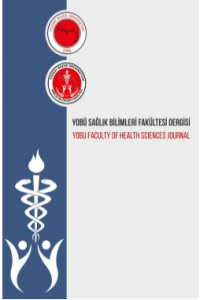COVID-19 PANDEMİSİ SÜRECİNDE HEMŞİRELİK ÖĞRENCİLERİNİN UYKU KALİTELERİNİN VE UYKU DÜZENLERİNİN İNCELENMESİ
Amaç: Kötü uyku kalitesi, öğrencilerde zayıf akademik performans, kazalar, dikkatsizlik ve saldırgan davranışlarla ilişkilendirilmiştir. Uyku kalitesi özellikle hemşirelik öğrencilerinin sağlığını ve yaşam kalitesini etkileyebilecek önemli bir faktördür. Geleceğin sağlık ordusunun en önemli parçası olacak hemşirelik öğrencilerinin pandemi sürecinde uyku kalitelerinin değerlendirilmesi kritik süreçlere uyum kapasitelerinin artırılması açısından önemlidir. Bu çalışmada hemşirelik öğrencilerinin COVID-19 pandemisi sürecinde uyku kalitelerinin ve düzenlerinin incelenmesi amaçlanmıştır.Gereç ve Yöntem: Kesitsel türdeki bu çalışmanın verileri, pandemi nedeniyle evlerinde karantinada bulunan 311 öğrenciden 14 Mayıs-14 Haziran 2020 tarihleri arasında online olarak toplanmıştır. Veri toplamada; “Sosyodemografik Veri Toplama Formu”, “COVID-19 Pandemisinin Uyku Düzeninde Yarattığı Değişikliklere İlişkin Anket Formu” ve “Pittsburgh Uyku Kalitesi İndeksi” kullanılmıştır. Verilerin analizinde tanımlayıcı istatistikler ve frekans dağılımları, gruplar arası karşılaştırmalarda One Way ANOVA, student t testi ve çoklu lineer regresyon analizi kullanılmıştır.Bulgular: Öğrencilerin yaş ortalaması 21.06±1.96 yıl, 257’si kadındı. Pittsburgh Uyku Kalitesi İndeki toplam puan ortalaması 6.15±3.19 olarak belirlendi. Öğrenciler pandemi nedeniyle uyku düzenlerinin olumsuz etkilendiğini belirtti. Çoklu Lineer Regresyon analizine göre ölçek toplam puanını en çok etkileyen değişkenin “pandemi nedeniyle uykuya dalmakta zorlanma” olduğu belirlendi (β=1.491; p<0.01).Sonuç: Öğrenciler pandemi sürecinde, uyku problemleri yaşamış ve uyku kaliteleri kötü etkilenmiştir. Öğrencilerin uyku kalitelerinin artırılması için desteklenmeleri ve buna yönelik girişimlerin planlanması önerilmektedir.
Anahtar Kelimeler:
uyku, uyku kalitesi, hemşirelik
EXAMINING THE SLEEP QUALITY AND PATTERNS OF NURSING STUDENTS DURING COVID-19 PANDEMIC
Objective: Poor sleep quality is associated with poor academic performance, accidents, carelessness and aggressive behaviors in students. Sleep quality is an important factor that can affect health and quality of life in nursing students. Evaluating the sleep quality of nursing students during the pandemic process, who will be the most important part of the future health army, is important in terms of increasing their adaptation capacity to critical processes. In this study, it was aimed to examine the sleep quality and patterns of nursing students during the COVID-19 pandemic.Materials and Methods: In this cross-sectional study, data were collected online from 311 nursing students, who were quarantined at home due to the pandemic, between May 14 and June 14, 2020, by using “The Socio-Demographic Data Form”, “The Questionnaire on the Changes in the Sleep Patterns due the COVID-19 Pandemic” and “The Pittsburgh Sleep Quality Index”. Data were analyzed using descriptive statistics and frequency distributions. One way ANOVA, student’s t-test and multiple linear regression analysis were used to compare groups. Results: The students’ mean age was 21.06±1.96 years, and 257 of them were female. Pittsburgh Sleep Quality Index total mean score was 6.15±3.19. Students stated that their sleep patterns were adversely affected due to the pandemic. According to the multiple linear regression analysis, the variable of “having difficulty falling asleep due to the pandemic” most affected their sleep quality (β=1.491; p<0.01). Conclusion: During the COVID-19 pandemic, students experienced sleep problems and their sleep quality was negatively affected. It is recommended to support them to increase their sleep quality and to plan relevant interventions.
Keywords:
Nursing, Sleep, Sleep Quality,
___
Referans1 Karataş Z. Social Impacts of COVID-19 Pandemic, Change and Empowerment. Turkey Journal of Social Service Research. 2020;4:3–15. Available from: https://dergipark.org.tr/tr/pub/tushad/iss ue/54680/722406.- Başlangıç: 2020
- Yayıncı: Yozgat Bozok Üniversitesi
Sayıdaki Diğer Makaleler
TEMEL SAĞLIK HİZMETLERİNDE YAŞLI BAKIMI VE KARŞILAŞILAN SORUNLAR
İbrahim KAYABEK, Sibel KARACA SİVRİKAYA
HEMŞİRELERİN KÜLTÜRLERARASI BAKIM VERME KONUSUNDAKİ GÖRÜŞ VE DENEYİMLERİNİN İNCELENMESİ
Didem KAYA, Şenay ARAS DOĞAN, Zehar GÖLBAŞI
Cevriye YÜKSEL KAÇAN, Aylin PALLOŞ, Özlem ŞENGÖREN DİKİŞ
MANEVİYAT, MANEVİ BAKIM VE MANEVİ BAKIMIN HEMŞİRELİKTE ÖNEMİ
